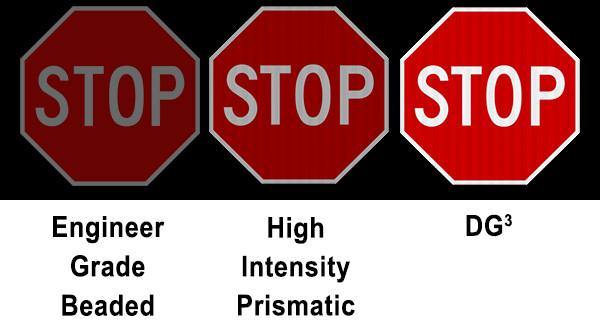Spoiler Alert: The word retroreflective simply means the most of the light returns to the source of the light (think headlights).
You just got some new stop signs in your subdivision and you noticed how much better the place looked. But did you realize how much more effective the new signs were? You may not have noticed during the day, but at night the newer signs really show their stuff. Look at the diagram above. Engineer Grade is no longer an acceptable alternative in the MUTCD- the bible for traffic signs. Here’s the thing: it may cost a bit more, not a lot more, to step up to at least high intensity prismatic, but its performance is more than 3X engineer grade and its expected life is over 40% longer. Now you can see why Municipal Supply & Sign Company recommends the use of 3M prismatic for all applications: parking lots, school signage, road signage and traffic signage.
Traffic signs provide an important means of communication to road users, and they need to be easily visible to be effective. At night, sign visibility is provided through the use of retroreflective sheeting materials. This material re-directs the light from vehicles headlamps back toward the vehicle. Without this retroreflective sheeting, signs would be largely ineffective…especially at night. The grade of the sheeting governs how much light is reflected back to the source of the light. That is why the driver of a small SMART car can see the same sign as the 18 wheeler that is traveling right behind him. The driver of that SMART car had better hope the driver of the big rig sees the stop sign or…..
Traffic sign technology has changed dramatically in just the last few years due to breakthroughs in retroreflective science. Significantly brighter signs are manufactured with 3M’s Full Cube Technology. This represents optimal performance in retroreflective technology, with optic elements that are nearly 100% efficient, resulting in sign sheeting that returns almost 60% of available light. The more the light is returned to the source, the better the driver can see. Compared to beaded engineer grade sheeting on the left and “truncated cube” high intensity prismatic sign sheeting in the middle, 3M DG3 reflective sign sheeting is noticeably brighter and more legible at a greater distance.
When headlights strike a traffic sign, the light is reflected back to the driver in a cone-shaped pattern..This “cone of reflectivity” or “cone of returned light” allows the driver to see the sign. The closer the driver is to the center of the cone, the brighter the sign appears. For drivers on the edge of or outside the cone, signs are dimmer and more difficult to see at night. It is now easy to understand why a sign’s position on the road shoulder is important to insure all drivers, no matter the size of the vehicle, can observe the sign.
As we age, our night time visibility is compromised to some degree. This is the reason the MUTCD underwent some significant changes recently. 3M prismatic sheeting is now the standard. If visibility is compromised such as in a hill, a sharp turn, or an upcoming road hazard, the 3M diamond grade sheeting would be our recommendation. Did you know that overhead signs are now being fabricated in diamond grade and the need for those lights on the highway is being questioned? Why not, the driver will see the overhead signs better with diamond grade than using the older signs that are backlit.

